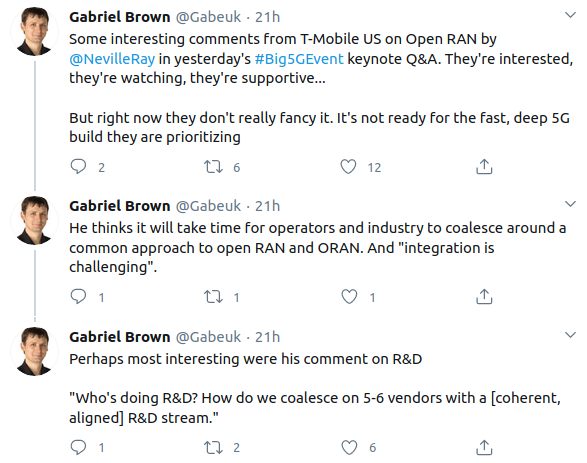Aikalailla noihin asioihin kulminoituu oma näkemys mitä toitkin esille. Muokkaan tätä vastausta kun aikaa vapautuu - viimeistään huomenna. 
Palailen tähän. Aiheena siis miksi Samsungilla markkinaosuuksien voittaminen ei ole helppoa:
- Asiakkuuksien vieminen vaatii rahalla kompensointia, kuten käsittääkseni myös Verizonen tapauksessa on pitkälti kyse. Jos vaihdetaan 4G tukiasemat uusiksi, tulee se kalliiksi. Jos tehdään toisen 4G päälle, kärsii performaatio. Voisi epäillä että moni asiakas ei ole valmis uhraamaan performaatiota, joten Samsung joutuu kompensoimaan isosti hinnalla. Kassa heillä on kyllä suuri, mutta voisi epäillä että myös kipurajoja löytyy.
BT, Vodafone and many other European operators say they must buy their 4G and 5G products from the same vendor to maximize performance.
An overlay alternative, promoted by Samsung, would take advantage of an interface called X2 to support handover between 4G equipment from one vendor and 5G gear from another.
Nokia will continue to maintain the 3G and 4G network, while Samsung will most likely cover the 5G segment using an “overlay” over Nokia’s 3G and 4G infrastructure.
Toisaalta sanotaan myös näin. Koontz alleges that Verizon will be going beyond this and ‘ripping out’ a lot of its existing 4G kit.
- Esimerkiksi Britanniassa operaattorit ovat sanoneet suoraan että hei eivät voi vielä unohtaa 2G ja 3g teknologiaa, ja tämä tosiaan voi muodostua kynnyskysymykseksi Samsungin suuntaan. Epäilen että tämä on myös muualla kuin Britanniassa.
“We cannot ignore the fact that there is a lot of our customers and businesses that rely on 2G/3G technology,” Andrea Donna, Head of Networks at Vodafone UK, said during the same Committee hearing.
“There are devices which are 2G/3G only enabled. The transition to a fully blow 4G/5G has to go hand-in-glove with our commercial colleagues to replace the devices on the ground and ensure that only 4G/5G devices are present before we can completely move away from 3G and 2G technology.”
- Alalla asiakkuudet ovat hyvin pitkiä, ja väliintyöntyminen on vaikeaa. Samsung tosin osoitti että se osin mahdollista Verizonen avulla, mutta ei myöskään tule odottaa että näin automaattisesti asiat tulevat menemään muualla.
“It was widely expected that Samsung would win market share in US mobile infrastructure,” says Gabriel Brown, a principal analyst with Heavy Reading, Light Reading’s sister company.
“It has invested in the region for a long time, and has been making steady gains. With the 5G cycle it now has the technology, products and in-market presence to expand share.”
While Samsung’s tech might be competitive in 5G, the experience Nokia and Ericsson have with older network generations help win contracts in some region.
- Ja sitten nostaisin esille myös sen softapuolen. Vaikuttaa että rauta on niin sanotusti kuumaa Samsungilla, mutta edelleen esimerkiksi DSS uupuu. Vaikuttaa että Nokia sekä Ericsson olisivat tässä edellä.
-
@kezist nosti myös esille hyviä asioita.
